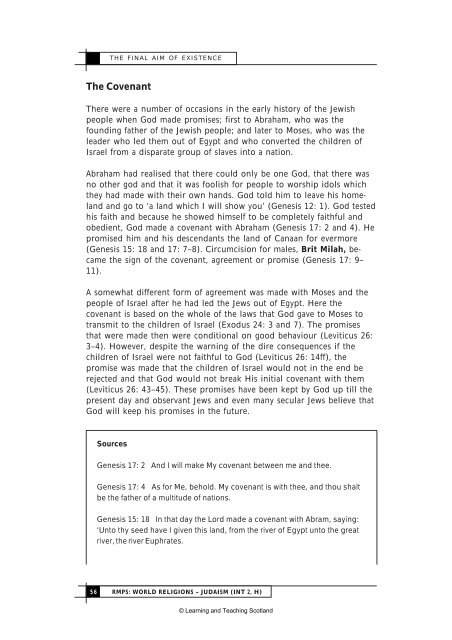RMPS - Int2/Higher - World Religions - Judaism - Education Scotland
RMPS - Int2/Higher - World Religions - Judaism - Education Scotland
RMPS - Int2/Higher - World Religions - Judaism - Education Scotland
You also want an ePaper? Increase the reach of your titles
YUMPU automatically turns print PDFs into web optimized ePapers that Google loves.
THE FINAL AIM OF EXISTENCE<br />
The Covenant<br />
There were a number of occasions in the early history of the Jewish<br />
people when God made promises; first to Abraham, who was the<br />
founding father of the Jewish people; and later to Moses, who was the<br />
leader who led them out of Egypt and who converted the children of<br />
Israel from a disparate group of slaves into a nation.<br />
Abraham had realised that there could only be one God, that there was<br />
no other god and that it was foolish for people to worship idols which<br />
they had made with their own hands. God told him to leave his homeland<br />
and go to ‘a land which I will show you’ (Genesis 12: 1). God tested<br />
his faith and because he showed himself to be completely faithful and<br />
obedient, God made a covenant with Abraham (Genesis 17: 2 and 4). He<br />
promised him and his descendants the land of Canaan for evermore<br />
(Genesis 15: 18 and 17: 7–8). Circumcision for males, Brit Milah, became<br />
the sign of the covenant, agreement or promise (Genesis 17: 9–<br />
11).<br />
A somewhat different form of agreement was made with Moses and the<br />
people of Israel after he had led the Jews out of Egypt. Here the<br />
covenant is based on the whole of the laws that God gave to Moses to<br />
transmit to the children of Israel (Exodus 24: 3 and 7). The promises<br />
that were made then were conditional on good behaviour (Leviticus 26:<br />
3–4). However, despite the warning of the dire consequences if the<br />
children of Israel were not faithful to God (Leviticus 26: 14ff), the<br />
promise was made that the children of Israel would not in the end be<br />
rejected and that God would not break His initial covenant with them<br />
(Leviticus 26: 43–45). These promises have been kept by God up till the<br />
present day and observant Jews and even many secular Jews believe that<br />
God will keep his promises in the future.<br />
56<br />
Sources<br />
Genesis 17: 2 And I will make My covenant between me and thee.<br />
Genesis 17: 4 As for Me, behold. My covenant is with thee, and thou shalt<br />
be the father of a multitude of nations.<br />
Genesis 15: 18 In that day the Lord made a covenant with Abram, saying:<br />
‘Unto thy seed have I given this land, from the river of Egypt unto the great<br />
river, the river Euphrates.<br />
<strong>RMPS</strong>: WORLD RELIGIONS – JUDAISM (INT 2, H)<br />
© Learning and Teaching <strong>Scotland</strong>
















